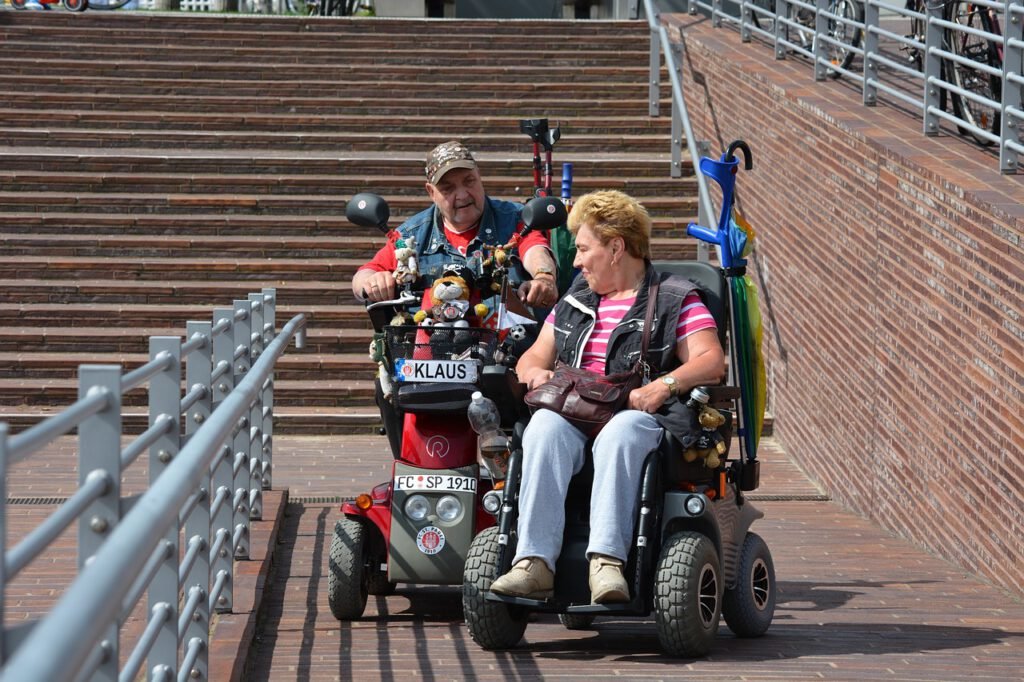Accepting a disability is not a challenge we anticipate, even if we all know that at some point, if we are blessed with a life that is long enough, it will come with age. That’s why I often say that contrary to popular belief, disability is not only an individual problem but a universal one; it will eventually touch everyone, but not at the same time.
Doctors estimate that I acquired a disability 5 seconds after being born, 46 years ago. It gave me a head start on disability compared to most people. I wish I also had a head start on overcoming that disability once and for all, like a one-shot milestone I would have cleared a long time ago after all the times I bravely picked myself up to keep going, but it doesn’t work that way. I can’t give you a quick solution, sorry. There is no way out, only a way through, but still a good one.
It would be nice to :
- be done with the frustration of my body disobeying my commands to move in a certain way; shouldn’t everyone be the boss of their own body?
- run errands or accept an invitation to new places without the risk of being unable to access them because of designs that look good but create barriers for me; shouldn’t everyone be able to say, ”I’ll be okay out there today?”
- be able to travel alone without worrying about whether I’ll be able to use a bathroom, wash myself, and dress myself in the morning. shouldn’t everyone be confident they can maintain good hygiene and be presentable to the world?
- to go to the grocery store without getting stared at because I walk funny.
I can be an angel of understanding and empathy during the first disability-related incident of any given day. However, after five of those on the same day, my patience runs thin, and I can shoot eye daggers when I have spent all my abled-bodied ignorance quota of the day, fed up with having to teach people nicely, again. (Hey, I’m only human.)
All this is to say that we can’t wish, pray away, or manifest the end of daily frustrations caused by a disability. Setting such an unattainable goal for ourselves would be so useless and unkind; a self-imposed attack on our mental health.
By no means would I give the impression that my life is some sort of Hell, but its irritants frequently pile up to the point that ”when it rains, it pours,” draining me physically and emotionally. I could say “should” about all that is unfair until the cows come home, but it wouldn’t change reality.
We don’t escape a disability. We use it to learn how capable and powerful we can be, even with a socially ostracizing difference. We can learn how strong we still are when we lessen the emotional load of those challenges with practice. I’m still working on getting better at dealing with frustration. It’s a good skill to develop for anybody who cares about having good relationships, anyway.
The science of accepting a disability
Since the end of the 2010s, researchers have started to gather suggesting that accepting a disability or adapting to it is a major factor determining who will be more likely to succeed in recovery and go back to living a fuller life even after it has been irrevocably changed by disability.
It seems that besides the availability of recent medical treatments and technologies, the degree of success in accepting a disability depends on the person’s willingness to expand their values and thinking to a point that would allow the perception of success and wholeness with disability. A Disability Acceptance scale developed by Linkowski (1971)1 and later evaluated in conjunction with the perception of physical appearance by Kaiser et al. (1987)2 produced 9 statements used to reflect a person’s acceptance of their disability.
Wondering how well you are doing on that Disability Acceptance Scale?
Without too much academic jargon, here’s what it boils down to a few statements summarizing how someone might perceive their disability, positively or negatively.There is no right or wrong answers, these are just hints for reflection.
On the spectrum of easy to very hard, how difficult is it for you to consider and accept the following statements about your disability?
- I feel satisfied with my abilities, and my disability doesn’t bother me too much.
- Though I am disabled, my life is full.
- It makes me feel very bad to see all the things non-disabled people can do which I cannot.
- My disability, in itself, affects me more than any other characteristic about me.
- Because of my disability, I am unable to enjoy social relationships as much as I could if I were not disabled.
- My disability causes me to think differently about everything.
- How a person conducts himself in life is much more important than physical appearance and ability.
- Personal characteristics, such as honesty and willingness to work hard are much more important than physical ability.
- There are many more important things in life than physical appearance.
In a fairly recent study in South Korea (2019)3, Eun-Young Park asked 84 persons living with cerebral palsy of various ages and demographics to rate their level of acceptance of those statements. As a result, she suggested that #7 should be excluded as the majority of participants (more than 54%) found it too difficult to accept. I see in it a sobering, persistent effect of society’s ableist pressure despite efforts to promote diversity.
I don’t believe we have to fully embrace every statement in order to accept a disability “enough” to help us move forward positively. However, I find it helpful to bring to light thoughts we might like to challenge and reframe to give ourselves a chance.
Because I have learned to put a priority on self-awareness – there is always power there despite a disability – discovering those statements made me ask myself :
- Based on those statements, where do you situate your thinking?
- Does it reflect your values, a judgment you have internalized in yourself?
- Does that judgment serve you well?
- How could you reframe it in a more helpful way?
Turning toward accepting a disability
Widening my thinking
I mentioned some daily challenges at the beginning of this post. On a new and better day, when I have taken good care of myself, I can approach the same challenges differently:
Yes, there will be things I can no longer perform alone, but with the help of other people and technology, I can still set goals, achieve them, and be proud of myself for not giving up. Nobody is supposed to be totally independent anyway. Independence is a myth. Every single human being—except for sociopaths, maybe—is hard-wired for interdependence, whether they have a disability or not.
When the day is tough, I can decide to take care of myself. Most people wait to experience burnout before getting serious about the physical and mental rest they need. because of my disability, I am better at it than most people.
Some places are inaccessible, but with a little more planning, I can call or email them ahead of time to inquire if they are accessible enough, and if the answer is negative, I can decide to bring my business and efforts elsewhere.
I have personal support workers coming every morning to help me dress as part of the free home healthcare that my Canadian taxes are paying for. It’s a little annoying at times when I don’t know the exact time they will show up, but I make all my appointments after noon so I know I can be dressed in time. Because PSWs help me, I can then go help other people once I’m ready—interdependence at its best.
Someone is looking at me funny at the grocery store? Perhaps they are judging me, perhaps they hope I won’t fall, perhaps they are not even thinking about me at all. Even if I like to think I’m very perceptive, I’m not a mind reader. Most people are very busy thinking about themselves anyway.
Am I still being judged unfairly? I’m sure it happens, but I can still have a positive impact on people’s early impressions of me. I have learned to be the one who instigates communication, who says hi first, showing other people who don’t know me that I am genuinely interested in them. That’s the best ice-breaker, and it has the power to melt judgments. Being an enthusiastic people person is one of my gifts, so I use it. Your talents, strengths and gifts don’t leave you once you acquire a disability. We can use our passions to emphasize what we have in common with others and restart from there. We can realize that we are still the protagonists of our own stories and that we are still part of meaningful narratives connecting with the world out there.
Small steps instead of mountains
What advice would you give yourself if you had to tackle a problem that seemed so much bigger than yourself that you felt overwhelmed and discouraged?
Most of us would say,
- break it down into achievable small steps;
- get started on a small step now;
- brainstorm possibilities without judging or criticizing yourself;
- take note of your successes in small steps to keep yourself encouraged and motivated;
- repeat.
That’s what I have been doing about accepting my disability since childhood. Small acceptance every ordinary day, and a steeper one when unavoidable change happened: the need to start using a cane at 18 years old, a walker at 40, more auto-immune chronic illnesses at 41, and depression at 42. When I first learned that my disability would never be cured, I was coming out of a hospital wailing. “A whole life of this? I will always be mocked and rejected? ” What a catastrophic thought, way too much to handle for an 8-year-old sweet kid like me. I don’t think an adult could bear the idea of eternal doom without being demoralized, either. On yucky days that don’t work out well, I’ve learned to say, “Oh well,” without shame. When I try again, I can say, “Okay body, okay mind, I accept you just like you are, for one day – or one week if I’m in a really good mood. I know one day is not out of my reach; I can achieve that, and it leaves me with more emotional and mental energy to remain open to the best the day might have to offer.
- Linkowski DC. A scale to measure acceptance of disability. Rehabil Couns Bull. (1971) 14:236–44. doi: 10.1037/t15375-000 ↩︎
- Rasch Analysis of the Disability Acceptance Scale for Individuals With Cerebral Palsy
Kaiser SB, Wingate SB, Freeman CM, Chandler JL. Acceptance of physical disability and attitudes toward personal appearance. Rehabil Psychol. (1987) 32:51–8. doi: 10.1037/h0091558 ↩︎ - Park, Eun-Young. “Rasch Analysis of the Disability Acceptance Scale for Individuals with Cerebral Palsy.” Frontiers in Neurology 10 (2019). https://doi.org/10.3389/fneur.2019.01260. ↩︎


